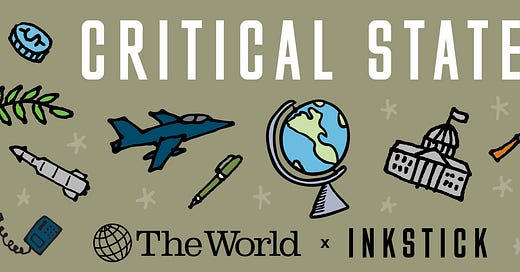Critical State: Who Pays?
If you read just one thing … read about the need for rich countries to pay for the climate crisis!
In The Nation, Carol Schaeffer has a new interview from Baku, Azerbaijan, with climate activist Lidy Nacpil.
Nacpil, an activist in her native Philippines since the 1980s, “has become a world-leading environmental-justice activist and is the coordinator of the Asian People’s Movement on Debt and Development, also known as Jubilee South. She has been a longtime advocate for debt-free climate justice to developing nations, ending fossil-fuel subsidies, and imposing a global wealth tax,” Schaeffer writes.
At COP29 in Baku, Nacpil had been organizing the people’s plenary and the “Pay Up” demonstration movement. As Schaeffer noted, “Nacpil’s messaging was reflected at the highest level of COP when the UN Secretary-General Antonío Guterres delivered his remarks at the opening of COP this year, saying, ‘Pay up, or humanity will pay the price.’”
Of climate activism, Nacpil said, “It’s about people. But it’s also about inequitable economic systems. It’s not by accident that the richest countries in the world are both wealthy and most responsible for the global greenhouse gas emissions. The economic system that has brought that about is the system that also has made them very rich.”
If You Read One More Thing: Civil Wrongs
In Jewish Currents, Alex Kane takes a look at Title VI, which, he writes, has been made into a “tool of repression” by pro-Israel groups, and how a second Trump term will “supercharge” efforts.
Kane writes, “Ever since students began protesting Israel’s devastating war on Gaza — which experts call a genocide — Title VI has been central to pro-Israel groups’ attempts to silence such dissent. In November 2023, the Anti-Defamation League (ADL), Hillel, the Brandeis Center, and the law firm Gibson, Dunn & Crutcher launched a new helpline to allow students to report what they define as antisemitic incidents, seven of which later became Title VI complaints.” And since anyone can file a civil rights complaint, even without having a connection to a given school, “Zionist actors have rushed to use the complaint system for their own ends.” And politicians have cited Title VI to push back against student protest.
Kane warns, “With Donald Trump poised to retake office in January, such patterns are set to intensify. Kenneth Marcus, the former head of OCR under Trump, predicted the new Trump administration would ‘take much more seriously the prospect of denying federal funds to colleges and universities that violate the rights of Jewish and other college students’ — a policy that could effectively make federal educational funding contingent on repression of pro-Palestine protests.”
Comma Splice

At The Dial, Julia Webster Ayuso looks at how forensic linguists use language to solve cold cases.
The piece is an introduction to readers to a “little-known” field called forensic linguistics: “In France, the use of stylometry — the study of variations in literary styles — has largely been confined to academic circles.” But now it’s being applied to a major criminal investigation.
Forensic linguists argue that how we each individually use language can be like leaving behind a fingerprint. The term “forensic linguistics” likely dates back to Sweden in the 1960s, but the most famous example comes from the United States: after sending anonymous letter bombs for more than 15 years, the “Unabomber” was caught after newspapers published his manifesto to try to get him to pause attacks, because people (including his own brother) reached out to say they recognized the writing style. An FBI linguist was able to use certain tics to narrow his location down to the Chicago area. And while it’s less a matter of light and death, linguists with computer science backgrounds have been able to use their skills to solve literary mysteries, like disproving a conspiracy that Molière didn’t write his own plays.
Deep Dive: Trust No One
In a new paper in the European Journal of Political Research, Daniel Devine, Viktor Valgardsson, Will Jennings, Gerry Stoker, and Hannah Bunting examine which qualities of governments influence their perceived trustworthiness. They look at the distinct roles of “competence,” “benevolence,” and “integrity.”
The authors “empirically test the effects of these three dimensions of trustworthiness through conjoint experiments conducted in five countries: Britain, Croatia, Spain, Argentina and France.” Competence, they write, is about whether the government has ability. Benevolence is about perceptions of the governments’ motivations — do the people believe that the government is acting in their interest? Finally, there is integrity, which “refers to whether the trusted is open, honest, and likely to be consistent in their behavior and is often associated with subscribing to laudable moral convictions.”
They measured the relative importance of these three qualities through “two different forced-choice, non-registered conjoint experiments, encompassing five countries from two continents.” In the first, they “fielded an extensive conjoint in the British Election Study (BES) in May 2020 which we matched with the extensive respondent-level data (e.g., education and income) in the same wave of the BES.” They then fielded an updated version in Croatia, Spain, Argentina, and France.
They found that benevolence was the most significant determinant. Still, they found “statistically significant heterogeneity between countries, with benevolence having a substantially larger effect in Spain and Croatia than in France and Argentina.”
But they also look at how the attributes are conditional on one another and how effects are moderate by the characteristics of respondents (that is, it’s not only up to the governments, but the traits of those they’re serving).
Ultimately, they found that “the effects of attributes are generally consistent, although respondent left-right ideology moderates the impact of government competence.”
The authors acknowledge key limitations of their study. For example, “it is difficult to precisely pinpoint the meaning and multi-faceted content of each of these dimensions in a survey experiment.” Also, their survey respondents were answering questions about a hypothetical government, meaning that there will likely be differences when these respondents are engaging not with a survey, but with reality: “In the real world, individuals will not perceive these government qualities (entirely) objectively.”
The authors suggest that future research should aim to further and better understand the dynamics they describe and explore in their paper. Additionally, future research “should also examine how people develop differing perceptions of these different dimensions of trustworthiness: for example, does economic performance primarily operate through perceptions of competence? Is the link between trust and vote intention primarily due to benevolence perceptions, and how does this vary across contexts and individuals?”
If future research does that, the authors and researchers more generally have reason to trust that their understanding of these issues will improve.
Show Us the Receipts
Hanan Zaffar wrote on how the diplomatic spat between India and Canada is getting even worse. As Zaffar explained, “Trade and cultural exchange has historically defined relations between the two countries, but Canadian Prime Minister Justin Trudeau’s allegation that India played a part in orchestrating last year’s killing of a prominent Sikh activist has led to a bitter standoff. … The clash stems from competing narratives. For Canada, a commitment to free speech allows pro-Khalistan activists to call for an independent Sikh state. India, though, is fiercely opposed to what it calls ‘terrorist elements’ that threaten its sovereignty.”
Marc Martorell Junyent looked at the lingering consequences of Germany’s split 35 years after its reunification. “Although US troops were the first to arrive at Thuringia, the territory — under the terms of a 1944 agreement between the Allies — was quickly transferred to Soviet troops, later becoming part of the GDR. Thirty-five years after the fall of the Berlin Wall on Nov. 9, 1989, which led to the reunification of Germany, there is no physical border between Bavaria and Thuringia anymore, but some significant differences remain.” The piece is focused on Saalfeld, which Junyent called a “microcosm of history.”
Rebecca Rosman reported on an independence movement in Okinawa that’s found support in Beijing. As Rosman explained, “the Ryukyu Kingdom” was “a once-independent maritime state that governed these South Pacific islands for centuries before Japan annexed it in the late 19th century. For a small but vocal group of mostly older activists … reclaiming this history and pushing for Okinawa’s independence from Japan is a deeply personal mission.” Increasingly, the movement’s found support from China, which “ sees the movement as an opportunity to destabilize Japan and weaken its alliance with the United States.”
Well-Played
Collect ‘em all!
Art imitates life.
Don’t have a cow.
If it walks like a chicken, clucks like a chicken…
What’s that got to do with breakfast?
What could explain this?
Critical State is written by Emily Tamkin with Inkstick Media.
The World is a weekday public radio show and podcast on global issues, news, and insights from PRX and GBH.
With an online magazine and podcast featuring a diversity of expert voices, Inkstick Media is “foreign policy for the rest of us.”
Critical State is made possible in part by the Carnegie Corporation of New York.






